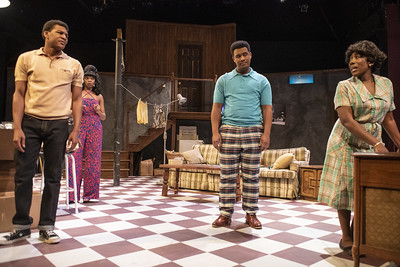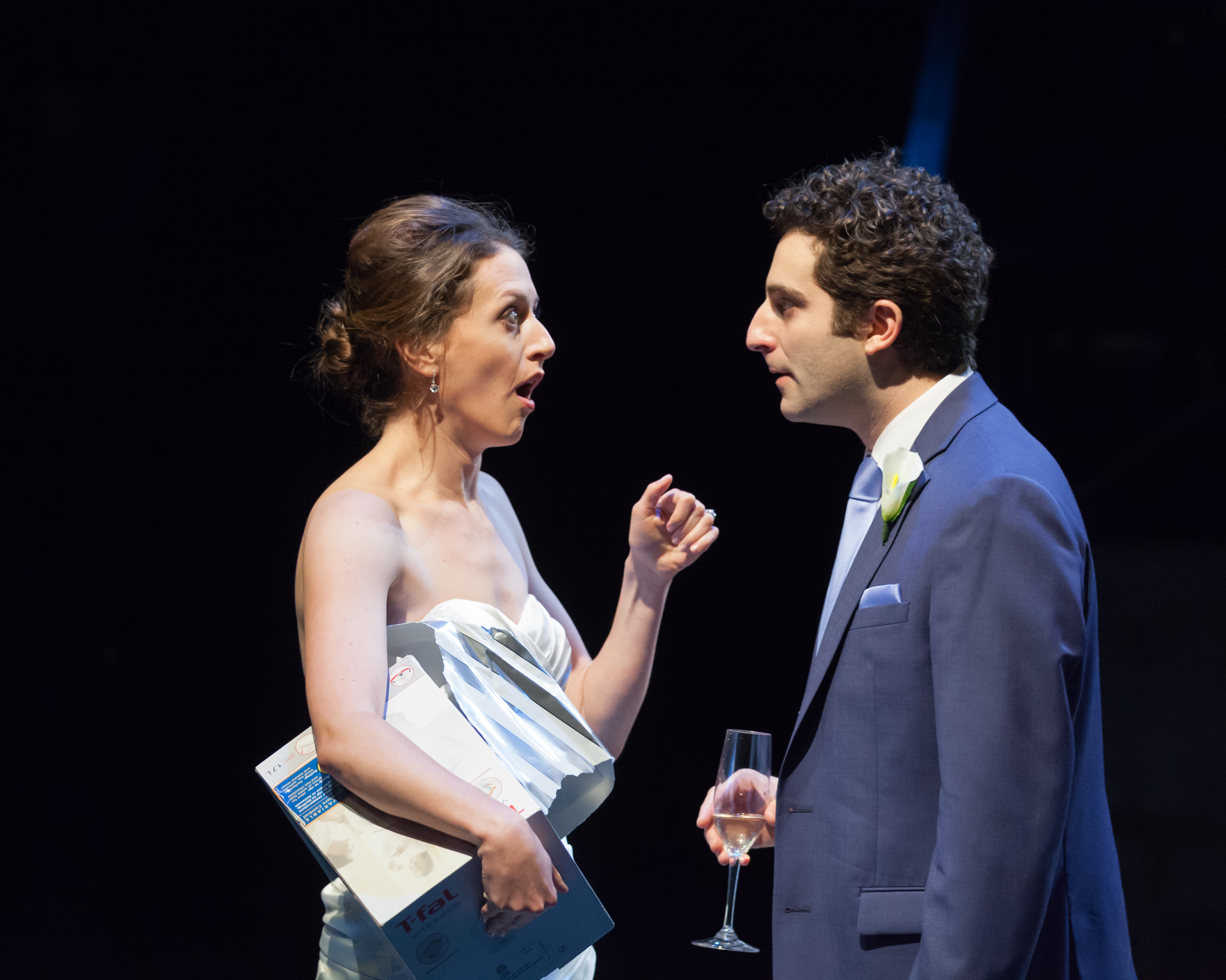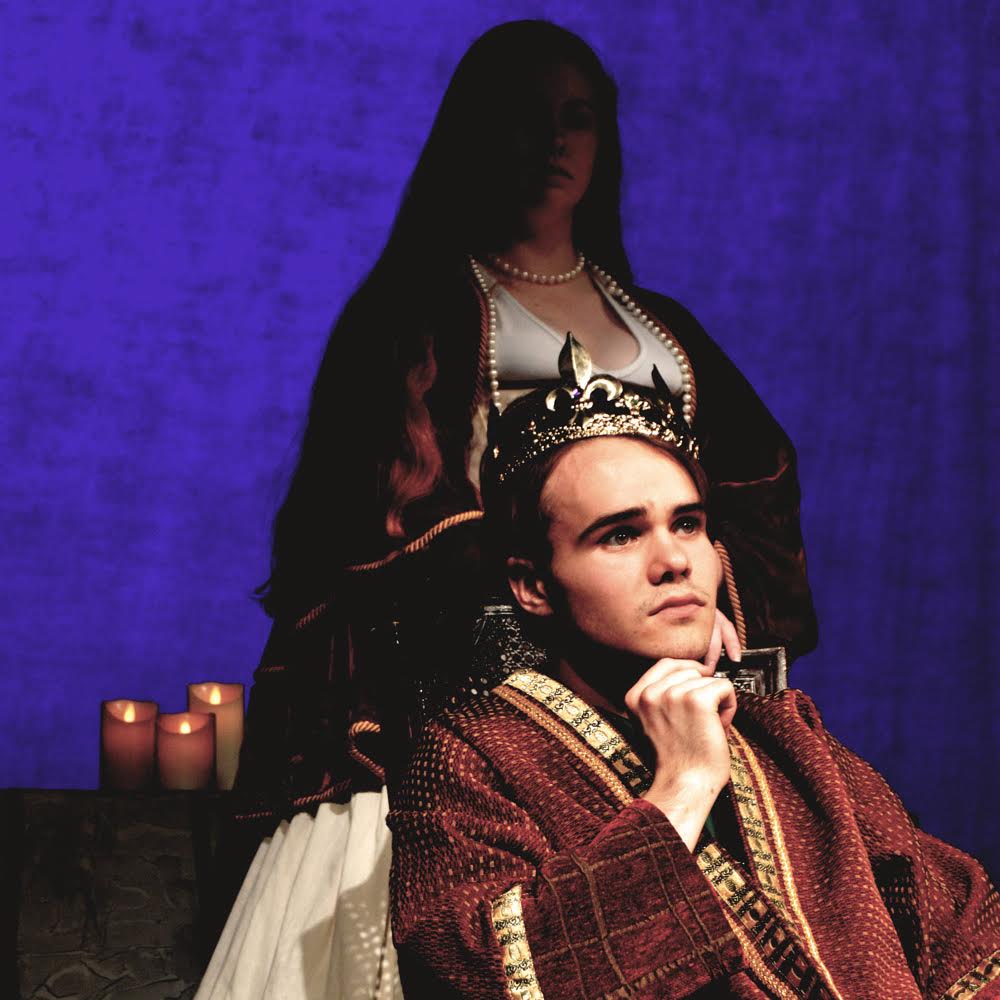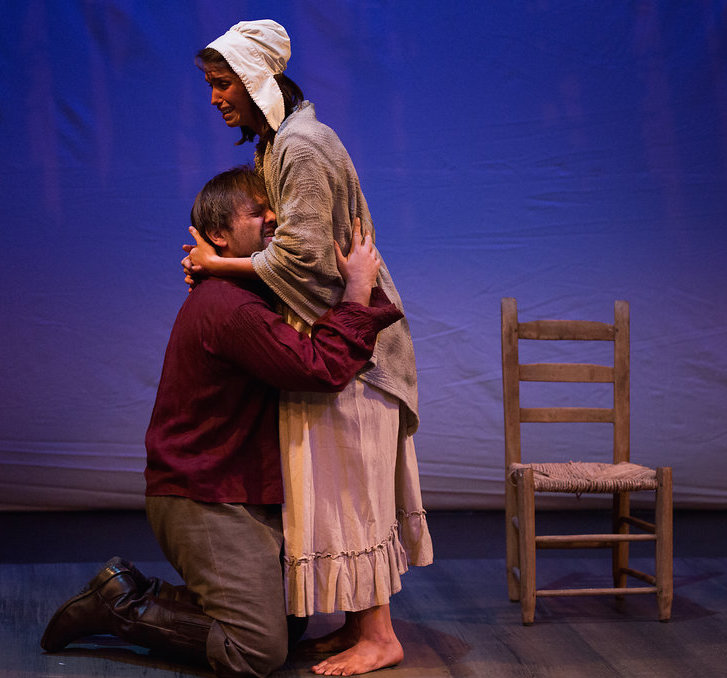Jahi Bogard, Brandi Threatt, Lamar Hardy, & Mutiyat Ade-Salu. Photo: University of Louisville
Detroit ‘67
By Dominique Morriseau
Directed by Johnny Jones
A review by Keith Waits
Entire contents are copyright © 2020 by Keith Waits. All rights reserved.
What you consider to be the turning point of the 1960s may depend on where you were standing. If you lived on the west side of Detroit it may have been July 1967, when five days of rioting left 42 dead. In Detroit ‘67, Dominique Morriseau creates a story just a short distance from the epicenter of that moment in history, one that puts a face to the volatile social dynamics that we tend to view with an almost abstract perspective 50 years later.
Chelle (Mutiyat Ade-Salu) and her brother Lank (Jahi Bogard) operate an unlicensed after-hours club in the basement of their house. Chelle’s friend Bunny (Brandi Threatt) and Lank’s close buddy Sylvester (Lamar Hardy) help bring them off. But Lank and Chelle have inheritance saved yup and he and Sylvester formulate a plan to use it to purchase a legitimate club with a liquor license. Matters are further complicated when the two men rescue a white female assault victim named Caroline (Fiona Blackburn) by bringing her into the basement.
All of this happens on a hot July evening in which the police raid another nearby after-hours club in a fashion that sparks public outrage and violence. The clashes occur offstage but hang over the five characters with dread and portent, and bring out the contrast in Chelle and Lank; she a solid, unyielding force rooted in the tradition of African Americans staying “underground”; keeping their head down to avoid trouble, while he is, “ready to be ABOVE ground”, to occupy a space in the community equal to the whites in power.
Morriseau has quickly risen to the top ranks of contemporary playwrights, a woman illuminating important truths about this moment in America, even when exploring milestone social upheavals from the not-so-distant past. Her characters are individual creations yet still capable of representing more than personal ambition, and are universal through their specificity.
That balance demands much of the actors and director Johnny Jones leads this cast in solid work with the text. Ade-Salu embodies Chelle’s maternal authority with such ease that it is tempting to imagine the character is much older than her brother when it is likely that they are actually close in age. She is the root and Lank is the wings ready to take flight, and Jahi Bogard plays him as younger and more impetuous; he doesn’t know why he brings a white woman off the street and into their home, he just acts. Taking risks comes naturally to him.
I loved the joyous energy that Brandi Threatt brought to Bunny; tall, sassy, and seemingly filled with the same spontaneity that fuels Lank, Threatt fills the space around the sibling conflict with color and humanity. Lamar Hardy’s Sylvester begins as comic relief but grows into a character that captures the potential that is lost to social injustice. The white woman, Caroline, is never intended to feel at home in this group, no matter how much Lank feels drawn to her, and Fiona Blackburn navigates that razor’s edge well enough. I do think she misses some of the character’s finer nuances. Morisseau may have positioned her to function as a plot device, but she has not allowed her to be one-dimensional either.
The good looking set by Jerome Wills includes a marvelous vintage cabinet radio/record player and eight-track tape player that are clear if perhaps trite signifiers of the changing times and Zhanna Goldentul employs a mix of striking colors and patterns in the costumes that conjure the period with only a hint of irony.
Detroit ‘67 is the third of Morriseau’s plays to reach a Louisville stage in the last few years, and it strikes me as the lesser of the group (Skeleton Crew and Pipeline are the others) but it still stands to be one of the most important productions of the season. It is arguably the “blackest” of the African American Theatre Program’s “Season of Black Plays” in that it charts a very particular cultural experience on both historical and personal terms.
Detroit ‘67
January 23-29, 2020
University of Louisville Dept of Theater Arts
U of L Playhouse
1911 South Third Street
Louisville, KY 40292
louisville.edu/theatrearts
Keith Waits is a native of Louisville who works at Louisville Visual Art during the days, where he is Managing Editor of their Artebella blog, and host of LVA’s Artebella On The Radio on WXOX-FM 97.1/ ARTxFM.com. But spends most of his evenings indulging his taste for theatre, music and visual arts. His work has appeared in LEO Weekly, Pure Uncut Candy, TheatreLouisville, and Louisville Mojo. He is now Managing Editor for Arts-Louisville.com.





